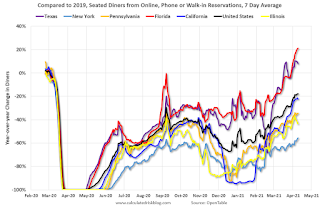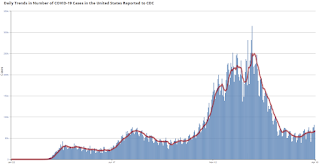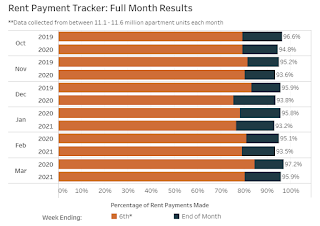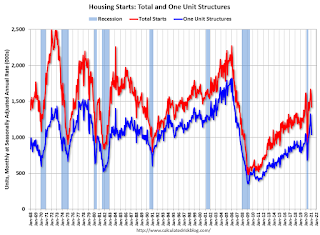by Calculated Risk on 4/12/2021 10:45:00 AM
Monday, April 12, 2021
Housing Inventory April 12th Update: At Record Lows
One of the key questions for 2021 is: Will inventory increase as the pandemic subsides, or will inventory decrease further in 2021?
Tracking inventory will be very important this year.

This inventory graph is courtesy of Altos Research.
Mike Simonsen discusses this data regularly on Youtube.
Minnesota Real Estate in March: Sales Up 3% YoY, Inventory Down 55% YoY
by Calculated Risk on 4/12/2021 10:11:00 AM
Note: I'm tracking data for many local markets around the U.S. I think it is especially important to watch inventory this year.
From the Minnesota Realtors®:
Total Residential Units Sold in March 2021 were 5,917, up 3.1% from 5,741 in March 2020.
Active Residential Listings in March 2021 were 7,738, down 54.8% from 17,124 in March 2020.
Months of Supply was 1.0 Months in March 2021, compared to 2.4 Months in March 2020.

This graph from the Minnesota Realtors® shows inventory in Minnesota since 2012. Inventory had been trending down, and then was flat over the last couple of years, and then declined significantly during the pandemic.
Seven High Frequency Indicators for the Economy
by Calculated Risk on 4/12/2021 08:17:00 AM
These indicators are mostly for travel and entertainment. It will interesting to watch these sectors recover as the vaccine is distributed.
The TSA is providing daily travel numbers.
 Click on graph for larger image.
Click on graph for larger image.This data shows the seven day average of daily total traveler throughput from the TSA for 2019 (Light Blue), 2020 (Blue) and 2021 (Red).
The dashed line is the percent of 2019 for the seven day average.
This data is as of April 11th.
The seven day average is down 38.7% from the same day in 2019 (61.3% of last year). (Dashed line)
There was a slow increase from the bottom, with ups and downs due to the holidays - and TSA data has picked up in 2021.
The second graph shows the 7 day average of the year-over-year change in diners as tabulated by OpenTable for the US and several selected cities.
 Thanks to OpenTable for providing this restaurant data:
Thanks to OpenTable for providing this restaurant data:This data is updated through April 9, 2021.
This data is "a sample of restaurants on the OpenTable network across all channels: online reservations, phone reservations, and walk-ins. For year-over-year comparisons by day, we compare to the same day of the week from the same week in the previous year."
Note that this data is for "only the restaurants that have chosen to reopen in a given market". Since some restaurants have not reopened, the actual year-over-year decline is worse than shown.
Dining picked up during the holidays, then slumped with the huge winter surge in cases. Dining is picking up again - and is above 2019 in Texas and Florida.
 This data shows domestic box office for each week and the median for the years 2016 through 2019 (dashed light blue).
This data shows domestic box office for each week and the median for the years 2016 through 2019 (dashed light blue). Note that the data is usually noisy week-to-week and depends on when blockbusters are released.
Movie ticket sales were at $49 million last week, down about 71% from the median for the week.
 This graph shows the seasonal pattern for the hotel occupancy rate using the four week average.
This graph shows the seasonal pattern for the hotel occupancy rate using the four week average. The red line is for 2021, black is 2020, blue is the median, and dashed light blue is for 2009 (the worst year since the Great Depression for hotels - before 2020).
Occupancy has increased to 2009 levels - and 2009 was horrible for hotels.
This data is through April 3rd. Hotel occupancy is currently down 16% compared to same week in 2019). Note: Occupancy was up year-over-year, since occupancy declined sharply at the onset of the pandemic. However, occupancy is still down significantly from normal levels.
Notes: Y-axis doesn't start at zero to better show the seasonal change.
 This graph, based on weekly data from the U.S. Energy Information Administration (EIA), shows gasoline supplied compared to the same week of 2019.
This graph, based on weekly data from the U.S. Energy Information Administration (EIA), shows gasoline supplied compared to the same week of 2019.Blue is for 2020. Red is for 2021.
As of April 2nd, gasoline supplied was off about 10.5% (about 89.5% of the same week in 2019).
Gasoline supplied was up year-over-year, since at one point, gasoline supplied was off almost 50% YoY in 2020.
This graph is from Apple mobility. From Apple: "This data is generated by counting the number of requests made to Apple Maps for directions in select countries/regions, sub-regions, and cities." This is just a general guide - people that regularly commute probably don't ask for directions.
There is also some great data on mobility from the Dallas Fed Mobility and Engagement Index. However the index is set "relative to its weekday-specific average over January–February", and is not seasonally adjusted, so we can't tell if an increase in mobility is due to recovery or just the normal increase in the Spring and Summer.
 This data is through April 10th for the United States and several selected cities.
This data is through April 10th for the United States and several selected cities.The graph is the running 7 day average to remove the impact of weekends.
IMPORTANT: All data is relative to January 13, 2020. This data is NOT Seasonally Adjusted. People walk and drive more when the weather is nice, so I'm just using the transit data.
According to the Apple data directions requests, public transit in the 7 day average for the US is at 67% of the January 2020 level. It is at 59% in Chicago, and 62% in Houston (the Houston dip was a weather related decline) - and moving up recently.
Here is some interesting data on New York subway usage (HT BR).
 This graph is from Todd W Schneider. This is weekly data since 2015.
This graph is from Todd W Schneider. This is weekly data since 2015. This data is through Friday, April 9th.
Schneider has graphs for each borough, and links to all the data sources.
He notes: "Data updates weekly from the MTA’s public turnstile data, usually on Saturday mornings".
Sunday, April 11, 2021
Sunday Night Futures
by Calculated Risk on 4/11/2021 07:27:00 PM
Weekend:
• Schedule for Week of April 11, 2021
Monday:
• No major economic releases scheduled.
From CNBC: Pre-Market Data and Bloomberg futures S&P 500 futures are down 5 and DOW futures are down 20 (fair value).
Oil prices were down over the last week with WTI futures at $59.32 per barrel and Brent at $62.95 per barrel. A year ago, WTI was at $22, and Brent was at $20 - so WTI oil prices are UP sharply year-over-year (oil prices collapsed at the beginning of the pandemic).
Here is a graph from Gasbuddy.com for nationwide gasoline prices. Nationally prices are at $2.84 per gallon. A year ago prices were at $1.84 per gallon, so gasoline prices are up $1.00 per gallon year-over-year.
April 11th COVID-19 Vaccinations, New Cases, Hospitalizations
by Calculated Risk on 4/11/2021 07:25:00 PM
Note: I'm looking forward to not posting this daily! I've been posting this data daily for over a year, and I'll stop once all three of these criteria are met:
1) 70% of the population over 18 has had at least one dose of vaccine,
2) new cases are under 5,000 per day, and
3) hospitalizations are below 3,000.
According to the CDC, 187.0 million doses have been administered. 28.1% of the population over 18 is fully vaccinated, and 45.9% of the population over 18 has had at least one dose (118.4 million people have had at least one dose).
And check out COVID Act Now to see how each state is doing.
 Click on graph for larger image.
Click on graph for larger image.This graph shows the daily (columns) 7 day average (line) of positive tests reported.
Note: The ups and downs during the Winter surge were related to reporting delays due to the Thanksgiving and Christmas holidays.
This data is from the CDC.
The second graph shows the number of people hospitalized.
 This data is also from the CDC.
This data is also from the CDC.The CDC cautions that due to reporting delays, the area in grey will probably increase.
Boston Real Estate in March: Sales Up 21% YoY, Inventory Down 3% YoY
by Calculated Risk on 4/11/2021 02:19:00 PM
Note: I'm tracking data for many local markets around the U.S. I think it is especially important to watch inventory this year.
For Boston (single family and condos):
Closed sales in March 2021 were 1,872, up 21.0% from 1,547 in March 2020.
Active Listings in March 2021 were 3,201, down 3.0% from 3,299 in March 2020.
NMHC: Rent Payment Tracker Shows Households Paying Rent Increased 1.9% YoY in Early April
by Calculated Risk on 4/11/2021 09:56:00 AM
The National Multifamily Housing Council (NMHC)’s Rent Payment Tracker found 79.8 percent of apartment households made a full or partial rent payment by April 6 in its survey of 11.6 million units of professionally managed apartment units across the country. This marks one year of tracking rent payment data following the onset of the pandemic.
This is a 1.9 percentage point increase from the share who paid rent through April 6, 2020 and compares to 82.9 percent that had been paid by April 6, 2019. This data encompasses a wide variety of market-rate rental properties across the United States, which can vary by size, type and average rental price.
“This month’s data is more evidence of a recovering economy and the resilience of the multifamily industry,” said Doug Bibby, NMHC President. “While we are not out of the woods yet, there is light at the end of the tunnel. The recently passed American Rescue Plan included $26 billion in rental assistance as well as billions more of housing resources that will prove critical to keeping families safely and securely housed and the nation’s rental housing sector stable.
emphasis added
 Click on graph for larger image.
Click on graph for larger image.This graph from the NMHC Rent Payment Tracker shows the percent of household making full or partial rent payments by the 6th of the month compared to 2019 and to the first COVID year.
This is mostly for large, professionally managed properties.
The second graph shows full month payments through March compared to the same month the prior year.
 This shows a decline in rent payments year-over-year.
This shows a decline in rent payments year-over-year.Saturday, April 10, 2021
April 10th COVID-19 Vaccinations, New Cases, Hospitalizations
by Calculated Risk on 4/10/2021 11:41:00 PM
Note: I'm looking forward to not posting this daily! I've been posting this data daily for over a year, and I'll stop once all three of these criteria are met:
1) 70% of the population over 18 has had at least one dose of vaccine,
2) new cases are under 5,000 per day, and
3) hospitalizations are below 3,000.
According to the CDC, 183.5 million doses have been administered. 27.3% of the population over 18 is fully vaccinated, and 45.1% of the population over 18 has had at least one dose (116.4 million people have had at least one dose).
And check out COVID Act Now to see how each state is doing.
 Click on graph for larger image.
Click on graph for larger image.This graph shows the daily (columns) 7 day average (line) of positive tests reported.
Note: The ups and downs during the Winter surge were related to reporting delays due to the Thanksgiving and Christmas holidays.
This data is from the CDC.
The second graph shows the number of people hospitalized.
 This data is also from the CDC.
This data is also from the CDC.The CDC cautions that due to reporting delays, the area in grey will probably increase.
Atlanta Real Estate in March: Sales Up 15% YoY, Inventory Down 58% YoY
by Calculated Risk on 4/10/2021 09:43:00 AM
Note: I'm tracking data for many local markets around the U.S. I think it is especially important to watch inventory this year.
From the GAMLS for Atlanta:
Total Residential Units Sold in March 2021 were 9,021, up 14.6% from 7,874 in March 2020.
Active Residential Listings in March 2021 were 7,418, down 58.3% from 17,802 in March 2020.
Months of Supply was 0.89 Months in March 2021, compared to 2.27 Months in March 2020.

This graph from the Georgia MLS shows inventory in Atlanta over the last several years - and the sharp decline in inventory at the start of the pandemic.
Schedule for Week of April 11, 2021
by Calculated Risk on 4/10/2021 08:11:00 AM
The key reports this week are March housing starts, CPI and retail sales.
For manufacturing, the March Industrial Production report and the April NY and Philly Fed manufacturing surveys will be released this week.
No major economic releases scheduled.
6:00 AM ET: NFIB Small Business Optimism Index for March.
8:30 AM: The Consumer Price Index for March from the BLS. The consensus is for 0.5% increase in CPI, and a 0.2% increase in core CPI.
7:00 AM ET: The Mortgage Bankers Association (MBA) will release the results for the mortgage purchase applications index.
12:00 PM: Discussion, Fed Chair Jerome Powell, Economic Club of Washington Interview, At the Economic Club of Washington
2:00 PM: the Federal Reserve Beige Book, an informal review by the Federal Reserve Banks of current economic conditions in their Districts.
8:30 AM: The initial weekly unemployment claims report will be released. The consensus is for a decrease to 720 thousand from 744 thousand last week.
 8:30 AM: Retail sales for March is scheduled to be released. The consensus is for a 5.5% increase in retail sales. The consensus is probably low (given the stimulus checks).
8:30 AM: Retail sales for March is scheduled to be released. The consensus is for a 5.5% increase in retail sales. The consensus is probably low (given the stimulus checks).This graph shows the year-over-year change in retail sales and food service (ex-gasoline) since 1993. Retail and Food service sales, ex-gasoline, increased by 7.0% on a YoY basis in February.
8:30 AM: The New York Fed Empire State manufacturing survey for April. The consensus is for a reading of 18.2, up from 17.4.
8:30 AM: the Philly Fed manufacturing survey for April. The consensus is for a reading of 43.0, down from 51.8.
 9:15 AM: The Fed will release Industrial Production and Capacity Utilization for March.
9:15 AM: The Fed will release Industrial Production and Capacity Utilization for March.This graph shows industrial production since 1967.
The consensus is for a 3.0% increase in Industrial Production, and for Capacity Utilization to increase to 75.8%.
10:00 AM: The April NAHB homebuilder survey. The consensus is for a reading of 83, up from 82. Any number above 50 indicates that more builders view sales conditions as good than poor.
 8:30 AM ET: Housing Starts for March.
8:30 AM ET: Housing Starts for March. This graph shows single and total housing starts since 1968.
The consensus is for 1.600 million SAAR, up from 1.421 million SAAR in February.
10:00 AM: University of Michigan's Consumer sentiment index (Preliminary for April).
10:00 AM: State Employment and Unemployment (Monthly) for March 2021


